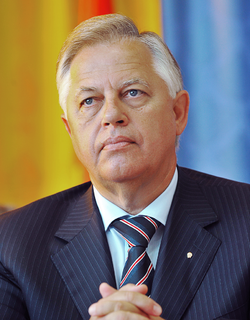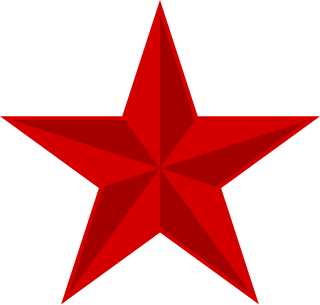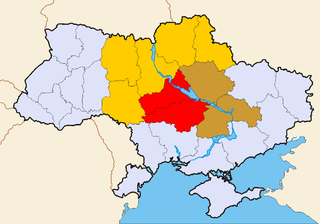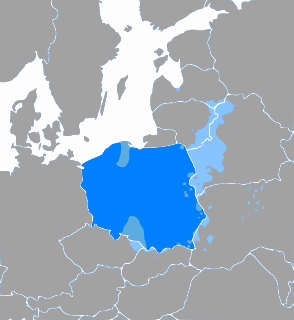
The Byelorussian Soviet Socialist Republic, also commonly referred to in English as Byelorussia, was a federal unit of the Soviet Union (USSR). It existed between 1920 and 1922, and from 1922 to 1991 as one of fifteen constituent republics of the USSR, with its own legislation from 1990 to 1991. The republic was ruled by the Communist Party of Byelorussia and was also referred to as Soviet Byelorussia by a number of historians.

The Ukrainian Soviet Socialist Republic, also known as the Soviet Ukraine, was one of the constituent republics of the Soviet Union from the Union's inception in 1922 to its breakup in 1991. The republic was governed by the Communist Party of Ukraine as a unitary one-party socialist soviet republic.
This article presents the historical development and role of political parties in Ukrainian politics, and outlines more extensively the significant modern political parties since Ukraine gained independence in 1991.

The Communist Party of Ukraine is a political party founded in 1993 as the successor to the Soviet-era Communist Party of Ukraine, which was banned in 1991 and since the April 2015 "Ukrainian decommunization law" legally the Ministry of Justice is allowed to prohibit the Communist Party from participating in elections.
This article gives an overview of liberalism in Ukraine. It is limited to liberal parties with substantial support, mainly proved by having had a representation in parliament. The sign ⇒ denotes another party in that scheme. For inclusion in this scheme, it is not necessary so that parties labeled themselves as a liberal party.

Elections in Ukraine are held to choose the President, Verkhovna Rada, and local governments. Referendums may be held on special occasions. Ukraine has a multi-party system, with numerous parties in which often not a single party has a chance of gaining power alone, and parties must work with each other to form coalition governments.

The Galician Soviet Socialist Republic was a self-declared and short-lived political entity that existed from 15 July to 21 September 1920. The communist state was established during a successful counter-offensive of the Red Army in the summer of 1920 as part of the Polish-Soviet War and in the course of which the Polish-Ukrainian joint military force was forced to retreat from its positions along the Dnieper that it secured earlier in 1920 all the way to the foothills of the Carpathian Mountains.

FC Stal Alchevsk is a Ukrainian professional football team of the Ukrainian First League that is based in Alchevsk. In the 2012–13 season the club won promotion to the Ukrainian Premier League, but the club refused this promotion "for the sake of the fans". In 2015, Stal withdrew from all competitions due to the escalating conflict in Eastern Ukraine.

Parliamentary elections were held in Ukraine on 29 March 1998. The Communist Party of Ukraine remained the largest party in the Verkhovna Rada, winning 121 of the 445 seats.

National communism refers to the various forms in which communism has been adopted and/or implemented by leaders in different countries. In each independent state, empire, or dependency, the relationship between class and nation had its own particularities. The Ukrainian communists Shakhrai and Mazlakh and then Muslim Sultan Galiyev considered the interests of the Bolshevik Russian state at odds with those of their countries. This was followed after 1945 by the Yugoslav communist leader Josip Broz Tito when he attempted to pursue an independent foreign policy.

Eastern Ukraine or East Ukraine generally refers to territories of Ukraine east of the Dnieper river, particularly Kharkiv, Luhansk and Donetsk oblasts. Dnipropetrovsk and Zaporizhia Oblasts sometimes are also regarded as Eastern Ukraine. In regard to traditional territories the area encompasses portions of the southern Sloboda Ukraine, Donbas, the western Azov Littoral (Pryazovia).
Danylo Lavrentiyovych Shumuk was a Ukrainian political activist who served a total of 42 years imprisoned by three different states, Second Polish Republic, Nazi Germany and Soviet Union.
Ukrainian Social Democratic Party (USDP) was a political party in Galicia. The party was founded in 1899 as an autonomous section of the Polish Social Democratic Party of Galicia by some members of the Polish Social Democratic Party of Galicia (PPSD) and the Ukrainian Radical Party in Lviv. The key leaders were Mykola Hankevych and Semen Vityk. It was based on the Ukrainian social democratic organization that already existed since 1897. The first congress of the party took place in Lviv in 1903. Few years later in 1906 the party was joined by its affiliate in Bukovina, the Social Democratic Party of Bukovina.
The Communist Party of Western Belarus was a banned political party in the Interwar Poland, infiltrated by Soviet special services operating in the territory of present-day West Belarus from 1923 until 1939; in Polesie (1932–1933) Słonim county (1934) and Vilnius. The organization was stockpiling smuggled weapons years before the 1939 Soviet invasion of Poland and received Russian instructions about how to act afterwards.

Central Ukraine consists of historic regions of left-bank Ukraine and right-bank Ukraine that reference to the Dnieper river. It is situated away from the Black Sea Littoral North and a midstream of Dnieper river and its basin.

The Young Communist International was the parallel international youth organization affiliated with the Communist International (Comintern).

In April 2015, a formal decommunization process started in Ukraine after laws were approved which, among other acts, outlawed communist symbols.

Alexander Shumsky or Oleksandr Shumskyi was a popular Ukrainian-Soviet politician and activist of 1920s, Bolshevik.













